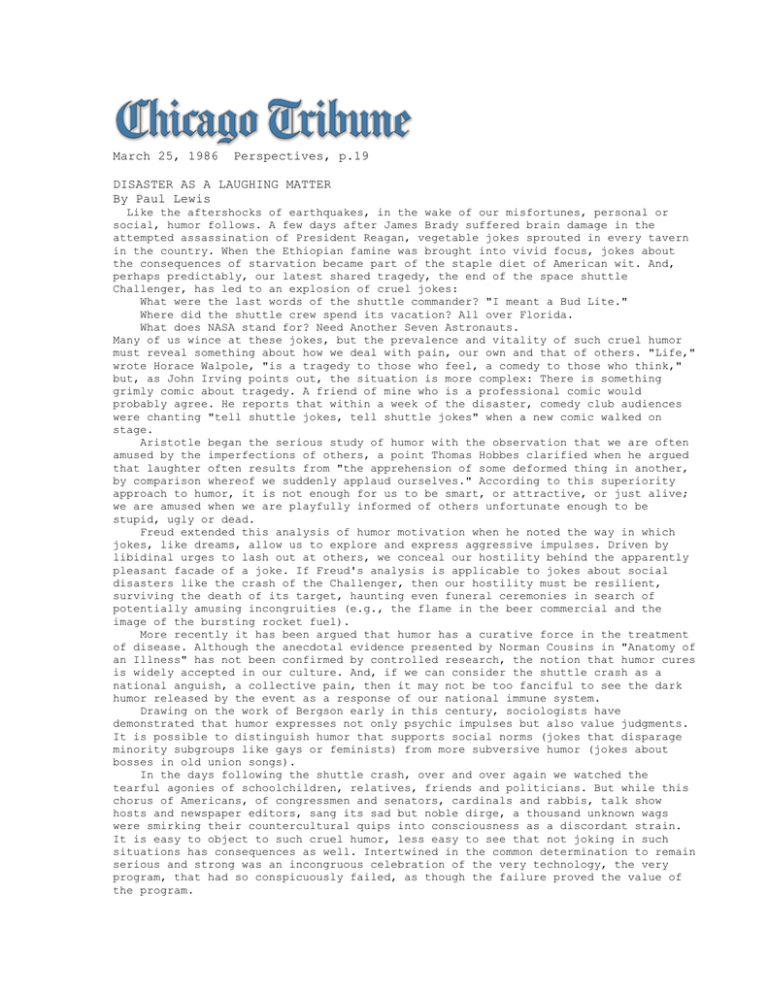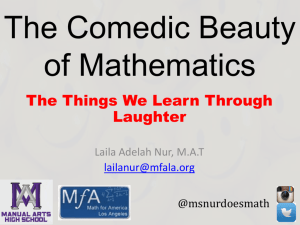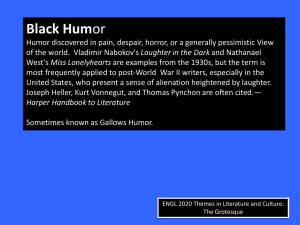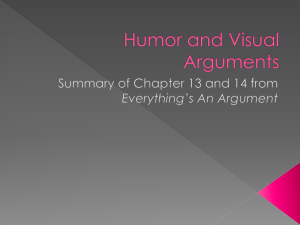March 25, 1986 Perspectives, p.19 DISASTER AS A LAUGHING MATTER
advertisement

March 25, 1986 Perspectives, p.19 DISASTER AS A LAUGHING MATTER By Paul Lewis Like the aftershocks of earthquakes, in the wake of our misfortunes, personal or social, humor follows. A few days after James Brady suffered brain damage in the attempted assassination of President Reagan, vegetable jokes sprouted in every tavern in the country. When the Ethiopian famine was brought into vivid focus, jokes about the consequences of starvation became part of the staple diet of American wit. And, perhaps predictably, our latest shared tragedy, the end of the space shuttle Challenger, has led to an explosion of cruel jokes: What were the last words of the shuttle commander? "I meant a Bud Lite." Where did the shuttle crew spend its vacation? All over Florida. What does NASA stand for? Need Another Seven Astronauts. Many of us wince at these jokes, but the prevalence and vitality of such cruel humor must reveal something about how we deal with pain, our own and that of others. "Life," wrote Horace Walpole, "is a tragedy to those who feel, a comedy to those who think," but, as John Irving points out, the situation is more complex: There is something grimly comic about tragedy. A friend of mine who is a professional comic would probably agree. He reports that within a week of the disaster, comedy club audiences were chanting "tell shuttle jokes, tell shuttle jokes" when a new comic walked on stage. Aristotle began the serious study of humor with the observation that we are often amused by the imperfections of others, a point Thomas Hobbes clarified when he argued that laughter often results from "the apprehension of some deformed thing in another, by comparison whereof we suddenly applaud ourselves." According to this superiority approach to humor, it is not enough for us to be smart, or attractive, or just alive; we are amused when we are playfully informed of others unfortunate enough to be stupid, ugly or dead. Freud extended this analysis of humor motivation when he noted the way in which jokes, like dreams, allow us to explore and express aggressive impulses. Driven by libidinal urges to lash out at others, we conceal our hostility behind the apparently pleasant facade of a joke. If Freud's analysis is applicable to jokes about social disasters like the crash of the Challenger, then our hostility must be resilient, surviving the death of its target, haunting even funeral ceremonies in search of potentially amusing incongruities (e.g., the flame in the beer commercial and the image of the bursting rocket fuel). More recently it has been argued that humor has a curative force in the treatment of disease. Although the anecdotal evidence presented by Norman Cousins in "Anatomy of an Illness" has not been confirmed by controlled research, the notion that humor cures is widely accepted in our culture. And, if we can consider the shuttle crash as a national anguish, a collective pain, then it may not be too fanciful to see the dark humor released by the event as a response of our national immune system. Drawing on the work of Bergson early in this century, sociologists have demonstrated that humor expresses not only psychic impulses but also value judgments. It is possible to distinguish humor that supports social norms (jokes that disparage minority subgroups like gays or feminists) from more subversive humor (jokes about bosses in old union songs). In the days following the shuttle crash, over and over again we watched the tearful agonies of schoolchildren, relatives, friends and politicians. But while this chorus of Americans, of congressmen and senators, cardinals and rabbis, talk show hosts and newspaper editors, sang its sad but noble dirge, a thousand unknown wags were smirking their countercultural quips into consciousness as a discordant strain. It is easy to object to such cruel humor, less easy to see that not joking in such situations has consequences as well. Intertwined in the common determination to remain serious and strong was an incongruous celebration of the very technology, the very program, that had so conspicuously failed, as though the failure proved the value of the program. This stiff-upper-lip, let's-carry-on response, promoted by the Reagan administration and transmitted by our media in oppressive repetition, worked against any consideration of the questions raised by the event: Is the shuttle a scientific or military program? Does it embody our highest instincts or our collective death wish? In a world of competing needs, is this the best way to allocate limited resources? Humor, of course, is not the same thing as problem solving, although both are rooted in the perception of an incongruity. In fact, humor often works to preserve the status quo by dismissing complex issues as mere joke material, so the jokes cited above are most likely not the satirical end of profound social criticism or unrest. But at least these jokes pause to notice the contradictions overlooked in the official and serious response. With no apparent self-consciousness, no awareness of the absurdity of their position, NASA officials quickly reaffirmed their commitment to the teacher-in-space program. Whatever we think about the jokes now circulating, we need to see the potential value of humor as a corrective to this sober folly. My own feeling is that the Reagan administration has done enough to undermine education, and that even if one supports this effort, the teacher-in-space program is a very expensive way to eliminate our most talented educators.




